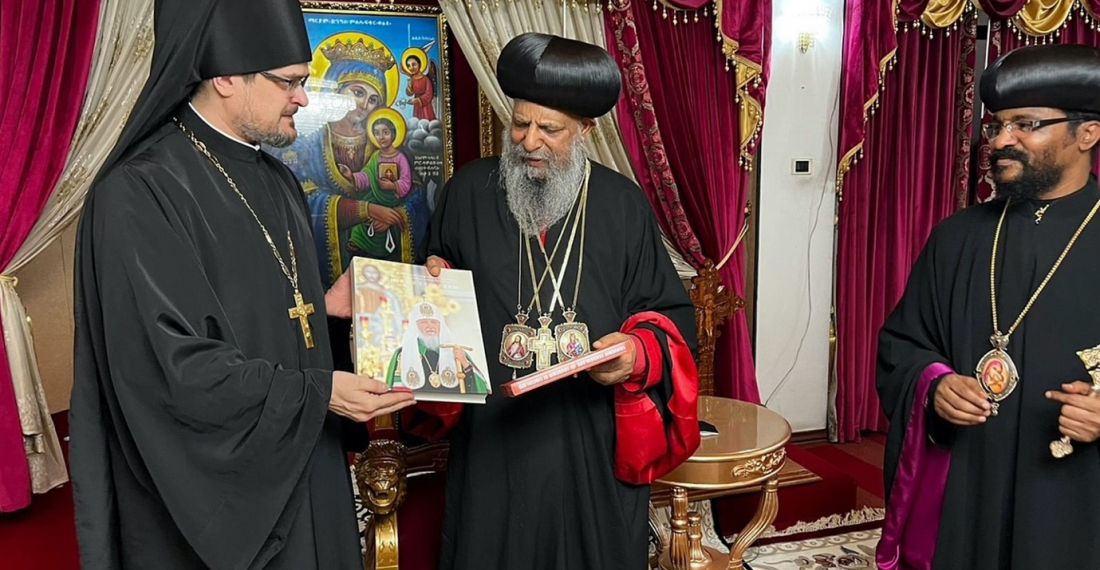Following in the footsteps of the Kremlin to expand its influence in Africa, the Russian Orthodox Church has been making approaches to Orthodox communities across the continent, with Ethiopia among the countries being targeted.
The Ethiopian Orthodox Tewahedo Church (EOTC) has welcomed the overtures of its Russian counterpart, according to news site Africa Intelligence.
This was reaffirmed in a February meeting in Addis Ababa, when the Primate of the Ethiopian Church, Patriarch Abune Mathias, received the secretary for inter-Christian relations of the Russian Orthodox Church, Hieromonk Stephen Igumnov. The pair discussed the introduction of a Russian parish in Addis Ababa for members of its church residing there.
In December of 2021, the head of the Russian Holy Synod, Patriarch Kirill of Moscow, announced the establishment of an exarchate for the entire African continent. Such an expansion will see Russian Orthodox institutions established throughout Africa, challenging the ancient sovereignty of the Orthodox Church of Alexandria.
In a press conference held in February of this year, the chosen Patriarch of Africa, Metropolitan Leonid Gorbachov, defended the expansion into Africa: “We’ve gone there for a long time, indeed for ever, no matter how events develop”. Along with “schools, alms houses, kindergartens and medical posts”, the institutions that agree to recognise the primacy of the Russian Patriarchate will receive material aid and protection by Russian military forces.
To further cement its foothold on the African continent, the Moscow Patriarchate will be introduce 102 clerics from eight African countries, governing two Dioceses: North Africa and South Africa.
The Russian Patriarchate has claimed that this expansion was in retaliation of Alexandria’s recognition of the Orthodox Church of Ukraine, a canonical territory which was granted its independence from Moscow in early 2019 by a decision of the Patriarchate of Constantinople. The Russian Church has always insisted that the Ukrainian Church is subject to its authority and has denied it autonomy, known as autocephaly.
At a General Priests’ Synaxis in Kinshasa last week, Patriarch Theodore II off Alexandria reaffirmed his discontent with the expansion of the Russian Orthodox Church in Africa. Claiming such a move to be in violation of the Canons, the Patriarch “promised before God and man to defend the rights of the Throne of Alexandria”.
The Canon Law of the Eastern Orthodox Church refers to a set of guiding principles and regulations, governing the actions of its 220 million followers, whilst also laying out geographical jurisdictions.
Whilst the establishment of the African Dioceses was done under an anti-Ukrainian rationale, experts believe it to be a further step in Russia’s expansion of its sphere of influence. As it lacks the economic and financial means to mirror China’s grab for influence on the continent, it looks towards the dissemination of its religious supremacy to gain political influence.
Other East-African Dioceses - Djibouti and Dire-Dawa, formally under the jurisdiction of the Church of Alexandria, have also welcomed the Russian Patriarchate into their canonical territories.
Whilst the Russian Orthodox Church does not have a formal political affiliation, it has in recent years become enmeshed in the Kremlin's overseas adventures. The expansion in Africa shows a growing aggression of Putin’s regime to expand its soft power, even in disregard of ancient religious norms.






